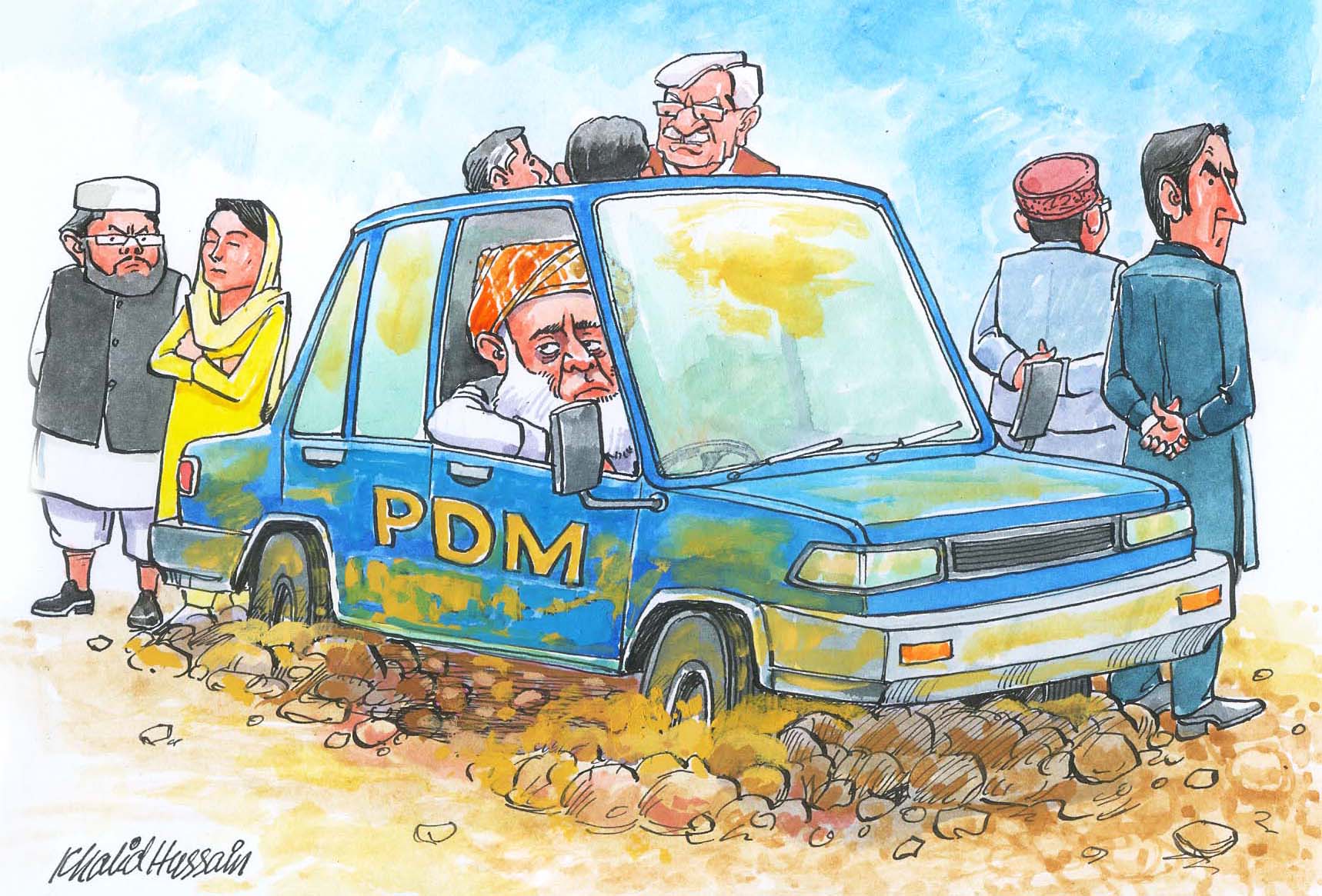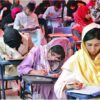It was not pretty at all. Leaders of Pakistan Muslim League-Nawaz (PML-N) and Pakistan Peoples Party (PPP) engaged in recriminations in full public view, their diehard social media cohorts at one another’s throats, each swearing by their own party’s fidelity to democracy and highlighting the other’s questionable provenance. For a while, it felt like the dirty nineties. And then, as if on the throwing of a switch, everything was brushed under the carpet.
Interestingly, cracks became visible in the 10-party opposition Pakistan Democratic Movement (PDM) only days after the coalition scored a resounding victory for the senate election to the Islamabad seat. The position taken by the Pakistan Peoples Party (PPP) over the proposal of submitting en masse resignations from the assemblies provided an opportunity to the PDM leadership to announce postponement of its anti-government long march slated for 26 March.
The decision regarding postponement of the long march was announced by a visibly perturbed Jamiat-e-Ulema-e-Islam-Fazl (JUIF) chief Maulana Fazlur Rehman, who is also the PDM president, while briefing reporters after presiding over nearly five-hour-long meeting of the heads of the component parties of the alliance in Islamabad on 16 March.
Declaring that the PPP had sought more time to reconsider its position on the issue of en masse resignations, he announced that “till the time the PPP will come back after an in-house discussion in its Central Executive Committee (CEC), the long march stands postponed”.
A piqued Maulana left the press briefing immediately after making a short statement, leaving behind the shell-shocked PPP and PML-N leaders to respond to probing questions from the reporters, who were only anxious to know whether or not the PDM still existed.
Claiming coalition was intact and justifying his party’s position after the Maulana’s statement, PPP’s Yousuf Raza Gilani explained that his party had sought time after the PDM leaders “bracketed” the long march with resignations. He maintained it had become necessary for the PPP to refer the matter to its CEC again as the powerful panel in its last meeting had opposed the idea of resigning from the assemblies.
Later, the differences within the PDM on the issue of the nomination of the opposition leader in the Senate also became public when both the PPP and the PML-N, the two arch-rivals of the past made their claims on the key office in the Upper House of the Parliament.
PPP chairman Bilawal Bhutto Zardari went so far as to visit the headquarters of the Jamaat-i-Islami (JI) at Mansoora to meet JI Ameer Sirajul Haq to seek support of the party’s lone senator for the opposition leader’s election.
During the course of arguments on the opposition leader’s issue, Bilawal and Maryam also indirectly made some personal attacks against each other. However, due to Maulana Fazlur Rehman’s timely intervention, the leadership of both the parties prevented their members from making any harsh statement against each other.
It was after the Maulana’s telephone call to Asif Zardari on 24 March that the PPP had given the call to its workers to accompany Maryam Nawaz during her appearance in NAB in Lahore on 26 March.
The fact that the PPP had come to the 16 March PDM meeting with full preparations were evident from the proceedings which were intentionally leaked by it to the media. All the TV channels were simultaneously running identical tickers containing the points raised by former President Asif Ali Zardari in his speech while the meeting was still in progress.
Later, speaking at a ceremony in Peshawar, Maulana Fazlur Rehman criticized the PPP for “leaking the proceedings of the meeting” to the media, saying that discussions in such meetings are always kept secret as a trust and leaking the proceedings amounts to a breach of trust.
During the meeting, PML-N’s vice-president Maryam Nawaz also reportedly had an argument with Mr Zardari when the latter taunted Nawaz Sharif, who was attending the meeting via a video link from London, asking him to return to the country and lead the campaign, if he was sincere in the efforts for the restoration of democratic rule in the country.
“Do not make such decisions which may force us to part ways,”Mr Zardari was quoted to have stated in the meeting. Interestingly, both Mr Zardari and his son Bilawal Bhutto Zardari also attended the meeting through a video link from Karachi – a fact Maryam took time to point out.
Mr Zardari reportedly said his party MPs were ready to hand over their resignations to Mr Sharif if he returned to the country with former finance minister Ishaq Dar, who has also been living in a self-exile in London for the past over three years.
In his speech, Mr Zardari also indirectly complained about the alleged discriminatory treatment of the provinces by the establishment when he mentioned that he had a domicile of Sindh province and said that Nawaz Sharif possessed the domicile of Punjab.
Responding to Mr Zardari’s points, Maryam Sharif categorically declared her father would not return to the country due to the alleged threats to his life. Ms Sharif said the whole PML-N, including herself, was present in the country to face jails, and asserted no one had the right to ask Mr Sharif to return.
Soon after the development, political and media analysts during the TV talks shows were found discussing various factors that might have caused the break-up of the opposition alliance with some of them alleging that the PPP has perhaps done so under some kind of an understanding with the establishment.
The PPP, however, rejected the perception, maintaining had the party reached any understanding with the establishment, Yusuf Raza Gilani would not have faced defeat in the election for Senate chairman office.
Instead, the PPP claims the PDM parties have failed to provide a clear roadmap and the post-resignation strategy. According to PPP secretary general Nayyar Bokhari, the PDM parties were repeatedly asked about the strategy which they would adopt after submitting resignations from the assemblies, but they failed to respond adequately.
According to the PML-N, even if the government decides to hold by-elections on the vacant seats and also in phases and according to its own choice of timing and place, then the PDM can again contest the elections jointly as they did in the recent by-elections, but only to resign again from the seats which will create a “perpetual crisis”.
The PPP believes that first of all the speaker will not accept the opposition’s resignations like the former speaker, Ayaz Sadiq did when the PTI members had resigned from the assembly during the famous 126-day Dharna at D-Chowk in 2014. The speaker can hold the resignations for an indefinite period as there is no mention of any time bar in the constitution or the assembly rules in this regard. Former Senate Chairman Raza Rabbani had also once held the resignations of the senators of the Muttahida Qaumi Movement (MQM) for an indefinite period before rejecting them through a ruling.
Secondly, the PPP says the move can provide an opportunity to the government to go for by-elections in phases in the constituencies of its choice, by accepting the resignations of the members one by one or in smaller groups.
Thirdly, the party says to stop holding of by-elections on their vacant seats, either they will be requiring the support of the establishment or they will have to create anarchy in the country and both the options are not good for the future of democracy in the country.
Anyways, the PDM’s decision to put off its long march has provided much respite to the ruling alliance headed by the Pakistan Tehreek-e-Insaf (PTI) as the government ministers now believe that the PDM will have to start from scratch if it wants to launch any street movement against it. For them, the PDM’s balloon has been pricked only after six months of its formation.
The government has gained much strength after the Senate elections as well as the winning of the trust vote by Prime Minister Imran Khan from the National Assembly. It is said that after the PPP’s decision, it has now become more difficult for the other parties in the PDM to quit the assemblies.
The government ministers while lauding the PDM’s decision to cancel its long march have once again invited the opposition for a dialogue on the electoral reforms. The prime minister has already asked the speaker to constitute a bipartisan parliamentary committee on the electoral reforms and the latter has in turn informed the parliamentary leaders of all the parties about the government’s intention. The PDM is yet to give a formal response to the proposal for the time being, although confusing and ambiguous remarks are coming from the opposition leaders on the subject.
Khalid Wasim is Islamabad based senior journalist. He writes on political issues.










